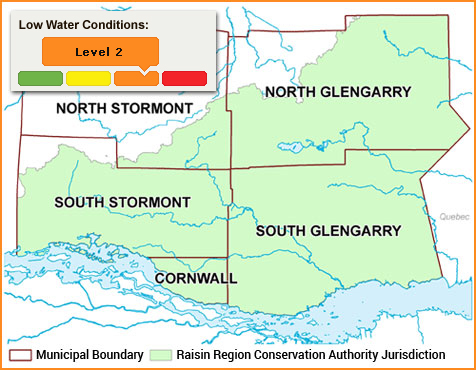Status: Level 2
RRCA Declares Low Water Level 2 Status
Friday, July 24, 2020 (10:24 AM)

The Raisin Region Conservation Authority (RRCA) Water Response Team has upgraded the Low Water Level 1 issued on July 3 to a Level 2 condition for the RRCA jurisdiction. Residents and businesses are asked to continue to voluntarily reduce their water consumption.
The RRCA monitors stream flows and precipitation data at gauges strategically placed throughout its jurisdiction consisting of the City of Cornwall, and Townships of South Glengarry, North Glengarry, South Stormont, and North Stormont. A low water status is declared once monthly stream flows and/or precipitation are below an expected amount.
Data records indicate local precipitation for the past 3 months is approximately 54% of what we normally receive this time of year, prompting the Team to upgrade to a Level 2 status. A Level 2 means there is an increased likelihood of drought conditions if the current weather trends continue. Residents and businesses are asked to reduce their water consumption by 20 % by limiting non-essential uses (e.g. lawn watering, car washing, etc.). Residents should also be aware of their municipality’s water conservation and fire bylaws in effect.
The RRCA Water Response Team, consisting of local representatives from provincial and municipal government, agriculture, and other special interest groups, met on July 23 to discuss the current conditions and next steps. Whether residents obtain their drinking water from a private well or municipal drinking water supply, the Team encourages all water users to practice water conservation to help reduce the severity of the low water conditions. Team members reported an increased demand on municipal water supply, some reports of dry wells in the region, reduced crop yields, and observations of dried-up streams not typically dry this time of year.
To gauge the local impacts of low water, residents and businesses are encouraged to fill out the RRCA’s feedback form at www.rrca.on.ca/drought if they are experiencing unusual low water-related problems, such as dry wells.
The RRCA will continue to monitor stream flows and precipitation as part of the Ontario Low Water Response Program and will provide updates as conditions change. For more information visit rrca.on.ca or contact (613) 938-3611 or info@rrca.on.ca.
Water Conservation Tips
• Repair any leaks in your home (e.g. taps and toilets)
• Reduce non-essential water usage such as lawn watering or car washing
• Only wash full loads of laundry or dishes
• Install a low consumption showerhead
• For farmers: monitor your irrigation systems for leaks, and consider irrigating closer to the evening to reduce evaporation loss
About Low Water Response and the RRCA
The Ministry of Natural Resources and Forestry (MNRF) manages water use during a drought. Ontario’s Low Water Response Program ensures provincial and local authorities are prepared in the event of low water conditions. The Raisin Region Conservation Authority assists the ministry by assessing local watershed conditions and notifying residents.
The Raisin Region Conservation Authority monitors precipitation and water levels throughout Cornwall; South Glengarry; and large portions of North Glengarry and South Stormont.
About Low Water Notices

Normal
Flows are in the normal range and precipitation accumulation has been close to average.

Level 1
Flows are less than 70 percent of their normal summer low flow and/or precipitation has been less than 80 per cent of average. Water users are asked to voluntarily reduce consumption by 10 per cent.

Level 2
Flows are less than 50 percent of their normal summer low flow and/or precipitation has been less than 60 per cent of average. The Ministry of the Environment and Climate Change will send letters to holders of Permits to Take Water to ask them to voluntarily reduce their consumption by 20 per cent.

Level 3
Flows are less than 30 percent of their normal summer low flow and/or precipitation has been less than 40 per cent of average. There is also potential for economic harm to water takers and/or significant harm to the ecosystem. The Water Response Team may ask the province to impose mandatory restrictions on those holding Permits to Take Water.
In the event of a low water status of anything other than normal, the RRCA will issue a media release and advise our member municipalities. A local Water Response Team will be convened to inform the MNRF and the public.
Useful Links
- Ontario's Low Water Response Program
- Ontario's Surface Water Monitoring Centre
- Water Smart - Protecting water from source to tap (PDF, includes water conservation tips)

